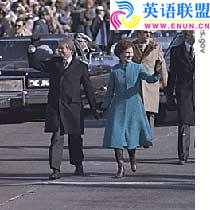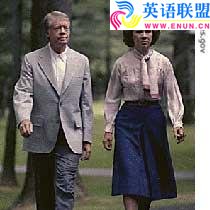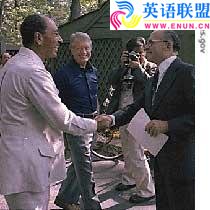Jimmy Carter brought Israel and Egypt together to end 30 years of conflict. But he lost support at home, in part because of his administration's failure to free Americans seized after the 1979 Islamic revolution in Iran.
VOICE ONE:
This is Rich Kleinfeldt.
VOICE TWO:
And this is Stan Busby with THE MAKING OF A NATION -- a VOA Special English program about the history of the United States.
(MUSIC)
Today, we tell about the administration of the thirty-ninth president of the United States, Jimmy Carter.
VOICE ONE:
 Jimmy and Rosalynn Carter in the inaugural parade | ||
But the new president is not riding in a car. He is walking. His wife, Rosalynn, and his daughter, Amy, walk with him. Crowds along Pennsylvania Avenue cheer. Bands play.
On this cold day in Washington, Americans look to the future. Watergate -- the crisis that led to the resignation of President Richard Nixon -- is several years in the past. The Vietnam War is history, too.
VOICE TWO:
Republican Gerald Ford served the remaining years of Nixon's term. Many people believe he brought respect and order back to the government. Yet he lost the office to Democrat Jimmy Carter in the election of Nineteen-Seventy-Six.
The nation still has problems. Unemployment is high. So is inflation. But the future of the nation looks bright. Jimmy Carter feels sure about his future, too. On the day before his inauguration, he said:
CARTER: "I do feel that the people of this nation and, I think, the entire world wish me well and want to see me succeed as president. And that gives me a sense of reassurance and confidence. I think I'm ready now to be president."
(MUSIC)
VOICE ONE:
During the election campaign, Carter often said he would be different from other presidents. He was not a member of the Washington political establishment. So he would do things in his own independent way.
Carter was from Georgia -- the "Deep South" of the United States. There had not been a president born in the South in more than one-hundred years. Carter studied nuclear engineering and attended the United States Naval Academy. He planned to stay in the Navy. Then his father died. And he decided to return to Georgia to operate the family peanut farm.
VOICE TWO:
Carter began his political life on the committee that supervised schools in his hometown. He also served in other local offices. In nineteen sixty-six, he failed to win the Democratic nomination for governor of Georgia. For the next four years, he traveled around the state gathering support. He won the next election.
As governor, Carter earned praise for reorganizing the state government. He also reformed state programs dealing with prisons and mental health care. In nineteen seventy-two, he offered himself as a candidate for vice president with presidential candidate George McGovern. But the Democratic Party chose someone else.
VOICE ONE:
Carter did not wait long to begin his next political move. He would try to win the Democratic presidential nomination in nineteen seventy-six.
Jimmy Carter was not well-known outside the state of Georgia. Political experts gave him little chance. Even his mother was surprised to learn that he wanted to be president. "President of what?" she asked.
VOICE TWO:
The farmer and former governor had a plan, however. He would try to win his party's primary elections in the South. He believed this would give him enough support at the party convention to win the nomination.
Other Democratic candidates tried to stop him, but his plan worked. By the time of the convention, he had enough support to win the nomination on the first ballot.
 The Carters at Camp David | ||
(MUSIC)
VOICE ONE:
President Carter believed strongly in human rights. He hoped he could use his new position to support human rights throughout the world. On this and other issues, he was not afraid of being criticized when he believed he was right.
For example, he believed it was right for the United States to end its control of the Panama Canal. He won ConGREssional support for treaties to give control to Panama by the year two thousand. He believed it was right to give diplomatic recognition to Communist China. And he believed it was right to continue negotiations with the Soviet Union about limiting nuclear weapons, even though he denounced human rights violations there.
In nineteen seventy-nine, Carter and Soviet leader Leonid Brezhnev signed the SALT Two treaty. However, Carter decided not to send the treaty to the Senate for approval after the Soviet Union invaded Afghanistan later that year.
VOICE TWO:
 Anwar Sadat and Menachem Begin at their first meeting at the Camp David summit |
||
VOICE ONE:
President Carter was not as successful in dealing with the economy. High unemployment and inflation continued. The federal deficit increased, although he had promised to end it. And there was a shortage of gasoline.
The shortage resulted when oil-producing countries limited production and exports. Carter urged American companies to develop new sources of energy, in addition to oil. He said the United States must do this, because it could not always depend on getting enough oil from other countries.
VOICE TWO:
During the gasoline shortage, Americans had to wait in long lines to buy fuel. They did not like it and were angry. Many were even more angry about a different situation. Like the gasoline shortage, it was a result of actions in another place.
In November nineteen seventy-nine, Muslim extremists in Iran seized the American Embassy in Tehran. They took many hostages, including more than sixty Americans. The extremists said they were punishing the United States for being friendly with ousted Iranian leader, Shah Reza Pahlavi.
VOICE ONE:
The extremists refused to negotiate. They refused to release the hostages. In early April nineteen eighty, President Carter broke relations with Iran. He then ordered American military forces to try to rescue the hostages in Tehran. The operation failed. A sandstorm caused two of the aircraft to crash into each other. They went down in the desert hundreds of kilometers away.
VOICE TWO:
The failed rescue attempt had a major effect on the presidency of Jimmy Carter. Many Americans felt it showed that he could not do the job. Their respect for him continued to decrease as the hostages continued to be held.
Other things were beginning to go wrong, too. The president's younger brother admitted receiving a large amount of money from Libya. He took the money in exchange for supporting Libyan interests with American lawmakers. His mistake was that he did not list his name as a representative of a foreign government.
(MUSIC)
VOICE ONE:
Nineteen eighty was a presidential election year in the United States. President Carter was expected to be the candidate of the Democratic Party. He almost ruined his chances, however, because of the situation in Iran. Carter hoped that concern for the hostages would unite the country behind him. Instead, support turned to blame.
Senator Edward Kennedy of Massachusetts believed he could defeat Carter for the nomination. Kennedy won several important Democratic primary elections. It was not enough. The party re-nominated Carter. Kennedy offered Carter his support, but not very strongly. This left the party divided.
VOICE TWO:
The Republicans got ready to win back the White House. They hoped to do it with a strong appeal to American voters. The appeal came from a man who would become one of America's most popular presidents -- Ronald Reagan.
That will be our story next time.
(MUSIC)
VOICE ONE:
This program of THE MAKING OF A NATION was written by Jeri Watson and produced by Paul Thompson. This is Rich Kleinfeldt.
VOICE TWO:
And this is Stan Busby. Join us again next week for another VOA Special English program about the history of the United States.


